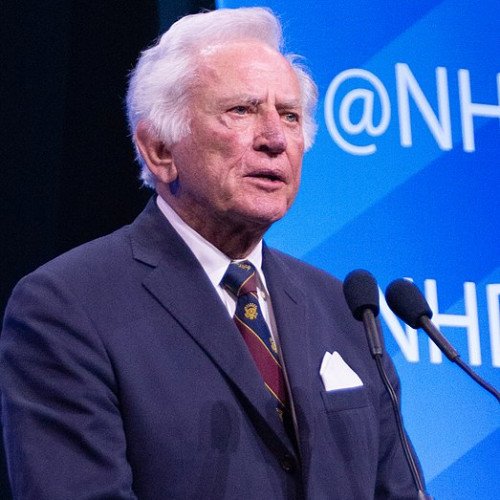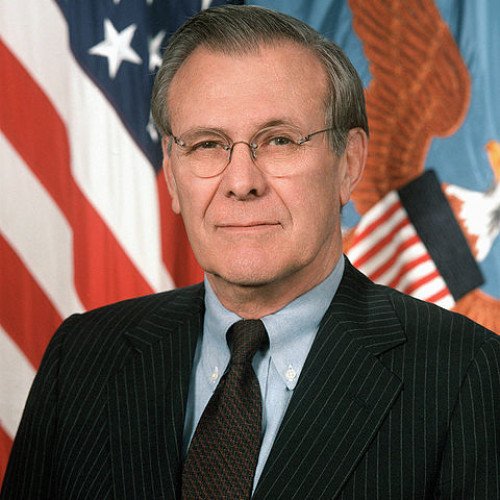Gary Hart VS Donald Rumsfeld

Gary Hart
Gary Warren Hart (né Hartpence; born November 28, 1936) is an American politician, diplomat, and lawyer. He was the front-runner for the 1988 Democratic presidential nomination until he dropped out amid revelations of extramarital affairs. He represented Colorado in the United States Senate from 1975 to 1987. Born in Ottawa, Kansas, he pursued a legal career in Denver, Colorado, after graduating from Yale Law School. He managed Senator George McGovern's successful campaign for the 1972 Democratic presidential nomination and McGovern's unsuccessful general election campaign against President Richard Nixon. Hart defeated incumbent Republican Senator Peter Dominick in Colorado's 1974 Senate election. In the Senate, he served on the Church Committee and led the Senate investigation regarding the Three Mile Island accident. After narrowly winning re-election in 1980, he sponsored the Semiconductor Chip Protection Act of 1984, becoming known as an "Atari Democrat". Hart sought the Democratic presidential nomination in 1984, narrowly losing the race to former Vice President Walter Mondale. Hart declined to seek re-election to the Senate in 1986 and sought the Democratic presidential nomination in 1988. He was widely viewed as the front-runner until reports surfaced of an extramarital affair, and Hart withdrew from the race in May 1987. He re-entered the race in December 1987 but withdrew from the race again after faring poorly in the early primaries. Hart returned to private practice after the 1988 election and served in a variety of public roles. He co-chaired the Hart-Rudman Task Force on Homeland Security, served on the Homeland Security Advisory Council, and was the United States Special Envoy for Northern Ireland. He earned a doctorate in politics from the University of Oxford and has written for outlets such as The Huffington Post. He has also written several books, including a biography of President James Monroe. Hart has been married to Lee (Ludwig) since 1958 and has two children.
Statistics for this Xoptio

Donald Rumsfeld
Donald Henry Rumsfeld (born July 9, 1932) is a retired American politician. Rumsfeld served as Secretary of Defense from 1975 to 1977 under Gerald Ford, and again from January 2001 to December 2006 under George W. Bush. He is both the youngest and the second-oldest person to have served as Secretary of Defense. Additionally, Rumsfeld was a three-term U.S. Congressman from Illinois (1963–69), director of the Office of Economic Opportunity (1969–70), counsellor to the president (1969–73), the United States Permanent Representative to NATO (1973–74), and White House Chief of Staff (1974–75). Between his terms as Secretary of Defense, he served as the CEO and chairman of several companies. Born in Illinois, Rumsfeld attended Princeton University, graduating in 1954 with a degree in political science. After serving in the Navy for three years, he mounted a campaign for Congress in Illinois's 13th Congressional District, winning in 1962 at the age of 30. While in Congress, he was a leading co-sponsor of the Freedom of Information Act. Rumsfeld reluctantly accepted an appointment by President Richard Nixon to head the Office of Economic Opportunity in 1969; appointed counsellor by Nixon and entitled to Cabinet-level status, he would also head up the Economic Stabilization Program before being appointed ambassador to NATO. Called back to Washington in August 1974, Rumsfeld was appointed chief of staff by President Ford. Rumsfeld recruited a young one-time staffer of his, Dick Cheney, to succeed him when Ford nominated him to be Secretary of Defense in 1975. When Ford lost the 1976 election, Rumsfeld returned to private business and financial life, and was named president and CEO of the pharmaceutical corporation G. D. Searle & Company. He was later named CEO of General Instrument from 1990 to 1993 and chairman of Gilead Sciences from 1997 to 2001. Rumsfeld was appointed Secretary of Defense for a second time in January 2001 by President George W. Bush. As Secretary of Defense, Rumsfeld played a central role in the invasion of Afghanistan and invasion of Iraq. Before and during the Iraq War, he claimed that Iraq had an active weapons of mass destruction program; yet no stockpiles were ever found. A Pentagon Inspector General report found that Rumsfeld's top policy aide "developed, produced, and then disseminated alternative intelligence assessments on the Iraq and al Qaida relationship, which included some conclusions that were inconsistent with the consensus of the Intelligence Community, to senior decision-makers". Rumsfeld's tenure was controversial for its use of torture and the Abu Ghraib torture and prisoner abuse scandal. Rumsfeld gradually lost political support and he resigned in late 2006. In his retirement years, he published an autobiography Known and Unknown: A Memoir as well as Rumsfeld's Rules: Leadership Lessons in Business, Politics, War, and Life.